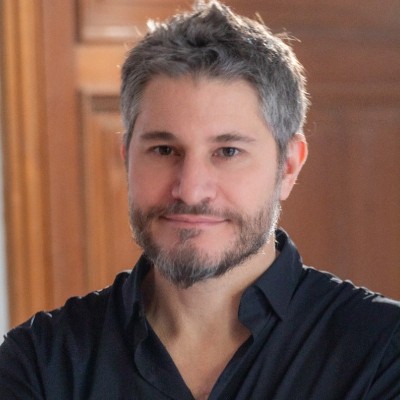
Agustin Ibanez
Director - Latin American Brain Health Institute (BrainLat) en Universidad Adolfo Ibáñez; Ass. Res. Prof. at TCD; CNC-UdeSA; Senior Atlantic Fellow (GBHI-UCSF)Agustin Ibanez is an Argentinean neuroscientist interested in global approaches to addressing diversity and disparity in brain health. He is a full professor and Director of the Latin American Brain Health Institute (BrainLat) at Universidad Adolfo Ibáñez (UAI, Chile). Also, Agustin is a professor of global brain health, and he directs the International Program in Global Brain Health Research at the Global Brain Health Institute (GBHI), Trinity College Dublin. He is a Team Leader of the Predictive Brain Health Modelling Group at Trinity College Dublin, a Senior Atlantic Fellow at the GBHI (UCSF), and a Research Associate Professor at GBHI-Trinity College Dublin. He has received multiple research funding from different international stakeholders, including the NIH/NIA, the Alzheimer’s s Association, The Fogarty International Center, the Rainwater Charitable Foundation (Tau Consortium), Takeda, GBHI (USA); the Inter-American Development Bank (IDB); ANID (Chile); COLCIENCIAS (Colombia); DAAD (Germany); CONICET (Argentina); MRC (United Kingdom); and Horizon 2020 (Europe). Dr. Ibanez holds a track record with +370 publications (+160 in the last five years), including top-ten journals (e.g., Nature Medicine, Lancet Neurology, World Psychiatry, Nature Reviews Neurology, Nature Aging, Nature Human Behavior, Trends in Cognitive Sciences, Trends in Neuroscience, Nature Communications, JAMA Neurology, Neuron, Brain, Alzheimer’s & Dementia, Nature Mental Health, Lancet Healthy Longevity). As a consultant, he has provided expertise in digital biomarkers and global approaches to dementia for startups and companies. This includes collaborating with Neureka, Cumulus Neuroscience, Altoida, Robin, Prodeo, Lilly, Bluefield, Roche, Cites, and Globant, as well as with the National Institutes of Health of the US as a member of the Special Emphasis Panel of U54 large-scale national grants for new technologies and health. Dr. Ibanez is the founder of significant regional initiatives, such as the Multi-partner consortium to expand dementia research in Latin America (ReDLat); the Latin American and Caribbean Consortium on Dementia (LAC-CD); and the BrainLat, affiliated with the GBHI (UCSF and Trinity), launched in 2021. These projects have received over $28 million in research funding and involve over 100 researchers across 15 sites in the US and Latin America. His team has developed a multicentric framework to address the unique impact of diversity in brain health, using computational neuroscience and machine learning approaches to maximize replications across diverse and underrepresented populations and.heterogeneous settings. He has developed new brain-phenotype models by integrating computational neuroscience with social, cognitive, and affective neuroscience to highlight the biological impact of structural inequalities related to socioeconomic, educational, stress-related, and exposome conditions. Dr. Ibanez is an active member of different societies, a Team taskforce of the Human Affectome Project, a former President of the Latin-American Chapter of the Society for Social Neuroscience, a former co-director of the Institute of Behavioral Sciences and Public Policies and the Institute of Cognitive and Translational Neuroscience (Argentina), a member of the ISTAART Advisory Council, and a member of the Scientific Advisory Board of AAIC (Alzheimer’s Association). Agustin has directed or co-directed more than 40 postgraduate research projects and created and directed the first major in Behavioral Sciences in South America in 2020. He has received prestigious international awards (including the ALBA-Elsevier Award on Brain Sciences, the IgNobel, the Outstanding Latin American Professor award from the Penser Foundation, the Nelson Butters Award of the International Neuropsychological Society; the Latin-American Award of the Society for Psychophysiological Research (four times); the International Society for Neuroimaging in Psychiatry Award) and local recognitions for his work in brain health (Outstanding recognition by the Legislature of Buenos Aires in 2019; and the Outstanding Neighbor Award of San Juan City, his birthplace, in 2021). He also has established current international collaborations with centers of excellence such as the MRC Cognition and Brain Science Unit of Cambridge and the University of Edinburgh (United Kingdom), the University of Heidelberg (Germany), The University of Sydney (Australia), and the Universities of California San Francisco, New York, Caltech, Chicago, and Wisconsin (USA), among others. He is an associate editor of different journals. His intense work has helped Latin American translational neuroscience by establishing a framework to engage scientists through internships, workshops, and master’s and Ph.D. programs, organizing educational activities for the health community, and focusing on brain health in underserved and underrepresented populations. His research has been highlighted in different outlets, including the BBC, Nature, Nature News, Nature Medicine, Nature Aging, Nature Social Sciences, Discovery Channel, Popular Science, Daily Mail, Newsweek, Le Monde, and Oxford University Press.
